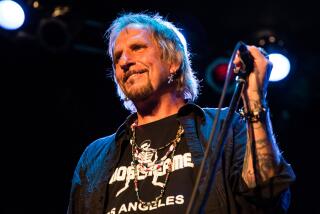Review: John Lydon recalls life as a punk (and beyond) in ‘Anger Is an Energy’
Most lives do not have second acts, as F. Scott Fitzgerald incessantly reminds us from beyond the grave. John Lydon is lucky enough to have enjoyed two distinct and significant acts. The trouble is they fell just a couple of years apart.
As Johnny Rotten, he fronted the Sex Pistols and employed his keening circular saw of a voice to deliver some of the most apocalyptic lyrics in the annals of popular music: “Anarchy in the U.K.,” “God Save the Queen,” “Holidays in the Sun,” “Bodies.” That period lasted from 1975, when Lydon was just 19, until 1978, when the already-disintegrating band dissolved altogether during its sole American tour from that era. His fate appeared sealed — where could he possibly go after achieving the status of world’s most notorious pop star?
Months later, he had reverted to his birth name and assembled Public Image Ltd., or PiL, with two extraordinary musicians, guitarist Keith Levene and bass player Jah Wobble (actually John Wardle, enduringly garbled by Lydon’s former cohort Sid Vicious). The Pistols had power to spare but little grace or finesse. PiL, on the other hand, played adventurous, textured sounds with a dance-music spine, combining with Lydon’s incantatory vocal stylings and harrowing lyrics — “Poptones,” “Careering,” “Death Disco,” “No Birds” — to produce music of real depth as well as power.
Lydon had first made history, then he made art. But PiL (Version 1) was rife with problems — personalities, drugs — and Levene and Jah Wobble were gone after just two albums. Since then, there have been other PiLs, Sex Pistols revivals, sundry TV shows and two memoirs — “Anger Is an Energy: My Life Uncensored” is the second.
Although his lyrics show Lydon to be a dab hand at the word game, his memoir is as-told-to, with all the drawbacks of that form. It takes us from the cradle to his current, rather serene existence as an American citizen living in Los Angeles.
The first 200-odd pages of the 544-page tome are naturally of greater interest. Lydon is at his best when writing about his family — his parents were working-class Irish immigrants — and on the subject of his doomed friend Vicious, born John Ritchie. Vicious was a dishrag who soaked up every ambient misery; if there were a disease in the neighborhood, he’d catch it. “Poor old Sid, he couldn’t have sex with anything. He was rubbish. But I loved him because he was rubbish!” Lydon is quite moving in his account of Vicious, who was abused by his vile mother — she seems to have introduced him to heroin, among other things — and who never got a thing right but nevertheless carried within him some ghost of intelligence and humor.
On the other hand, Malcolm McLaren, who recruited and managed the Sex Pistols, is exhumed from his coffin every dozen pages for a round of slaps. “I don’t think Malcolm ever liked music at all.” He and his crowd were “hippie art-wankers,” Lydon writes, who treated the band as a conceptual-art project and routinely made grotesque managerial decisions based on aesthetic whims, regardless of their merit, practicability or physical hazard. He was constantly telling reporters whatever popped into his head — he may have proposed that the Pistols’ second album be produced by Charles Manson. Of course, Lydon’s account is necessarily partial. McLaren, whatever his failings, was crazy enough to devise the Sex Pistols and to pull off a multi-year publicity campaign fueled by outrage, which was not quite a thing then.
Lydon distances himself from some of the more boneheaded ideas that have attached themselves to punk, a concept that will adhere to him for as long as his name is remembered. “Disco sucks? You never heard that from me.” (He attests to his affection for the Fatback Band and Kool and the Gang.) He sneers at “poor old Joe Strummer” and his political stance, which like many good intentions in popular music curdled quickly into meaningless cliché, less with the Clash than with the band’s lesser epigones — “Studded leather jackets for everyone is not a creed I can endorse.”
He is good at evoking the shambolic conditions that somehow resulted in the production of PiL’s masterwork, “Metal Box” (1979), although evasive about the band’s fragmentation. He is, however, exhaustively detailed on a great many other matters — his later tours, his security arrangements, his reality-TV antics — of interest only to the most devoted of Lydon’s fans.
Like many celebrity autobiographies, “Anger Is an Energy” is less a book than it is a rant, arranged more or less chronologically. Lydon can turn a fine phrase even in dictation, but these are vastly outnumbered by sentences that could begin “I’m the kind of guy who…”
He is touchy and defensive, keeps grudges alive for decades, does not display much engagement with the wider world. But who am I to judge? He had drained the cup of fame by a tender age, and in his heyday’s long aftermath, what was once spontaneous has calcified into shtick, for survival’s sake. His self-absorption is at worst a venial sin, and his book’s failings should be charged to its editor.
Sante’s books include “Low Life” and “The Other Paris,” which will be published this fall.
Anger Is an Energy
My Life Uncensored
John Lydon
Dey Street: 544 pp., $28.99
More to Read
Sign up for our Book Club newsletter
Get the latest news, events and more from the Los Angeles Times Book Club, and help us get L.A. reading and talking.
You may occasionally receive promotional content from the Los Angeles Times.









